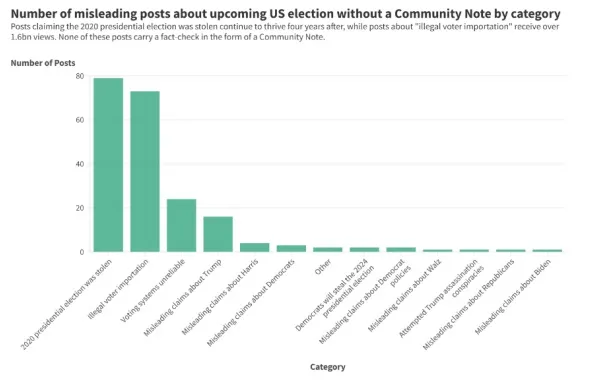Well, if there was any question as to whether Meta’s looking to better align itself with the incoming Trump administration, that now seems pretty clear.
Today, Meta CEO Mark Zuckerberg has announced that the company is discontinuing its fact-checking program, and moving to an X-style “Community Notes” system for clarifying claims made by users in its apps, while it’s also looking to bring more political content back to its apps.
As per Zuckerberg:
“We’ve reached a point where [our moderation systems] make too many mistakes, and it’s too much censorship. The recent elections also feel like a cultural tipping point towards once again prioritizing speech. So we’re going to get back to our roots, and focus on reducing mistakes, simplifying our policies, and restoring free expression on our platforms.”
Zuckerberg refers to his speech to Georgetown University back in 2019, in which he underlined his commitment to free expression in Meta’s apps. A lot has changed since then, and now, despite Meta looking to shift away from political content entirely, in line, it claimed, with user demand, Zuckerberg says that the time has come to bring more political and civic debate back to Meta’s apps.
Why? Because platforms are being pushed to censor more, by “legacy media” and others:
“A lot has happened over the last several years. There’s been widespread debate about potential harms from online content, governments and legacy media have pushed to censor more and more.”
In terms of specifics, Zuckerberg says that Meta will remove its restrictions on topics like immigration and gender “that are out of touch with mainstream discourse.”
On another front, the company is also moving its trust and safety and content moderation teams out of California, and shifting its content review efforts to Texas, where X is also building a new content moderation center.
Meta’s new Chief Global Affairs Officer Joel Kaplan made the initial announcement of the update on Fox News, where he also referred to Meta’s core mission of enabling free speech.
As per Kaplan:
“In recent years we’ve developed increasingly complex systems to manage content across our platforms, partly in response to societal and political pressure to moderate content. This approach has gone too far. As well-intentioned as many of these efforts have been, they have expanded over time to the point where we are making too many mistakes, frustrating our users and too often getting in the way of the free expression we set out to enable.”
So it’s mistakes that Meta’s looking to address here, and it has nothing to do with pressure from the incoming Trump administration. Yep, that’s what it is.
On Community Notes, Kaplan says that this approach has worked on X, “where they empower their community to decide when posts are potentially misleading and need more context.”
Which it hasn’t, not in the sense that Kaplan’s suggesting. But Kaplan says that he believes that this could be “a better way of achieving our original intention of providing people with information about what they’re seeing – and one that’s less prone to bias.”
And yes, it will include the most notable flaw in X’s Community Notes system:
“Just like they do on X, Community Notes will require agreement between people with a range of perspectives to help prevent biased ratings.”
This specific element has limited the capacity of Community Notes to be applied to some of the most divisive, politically-motivated content in the app, because on some issues, like election interference, immigration, “stolen” elections, etc., there will never be full spectrum agreement. As such, reports have found that the vast majority of proposed Community Notes are never displayed.

It’s worth also noting that X has less than a 10th of Meta’s audience reach.
You can imagine what the impact of the same could be at Meta’s scale.
Indeed, X is already a hive of unchecked false claims and misleading information, primarily led by X owner Elon Musk himself. It seems less likely that Zuckerberg is going to get involved in such, though the outcome will be largely the same, while the shift in policy also contradicts Meta’s previous notes that its users have had enough of divisive political commentary taking over their feeds.
That was the original, communicated motivation for Meta to deprioritize political content entirely, that, according to Zuckerberg (back in 2021):
“One of the top pieces of feedback we’re hearing from our community right now is that people don’t want politics and fighting to take over their experience on our services.”
The combination of negative user feedback, and media criticism of the company, along with the rise of short-form video, primarily focused on lighthearted material, gave Meta an opportunity to shift away from divisive politics entirely, with the company even adding a political content opt-in toggle on Threads.
But now, it’s going the other way, and I can only imagine that this request has come from the President-elect himself.
Back in November, following Trump’s election win, Zuckerberg traveled to Mar-a-Lago to have dinner with Trump, in what many saw as a surprising turn.
Surprising, because Trump, in a recently published book about his time as president, had threatened to jail Zuckerberg for life if he was ever returned to power, due to Zuckerberg’s perceived political interference via censorship of Trump’s posts on Facebook.
It now seems pretty clear how that meeting went, with Trump demanding that Zuckerberg:
- Remove Nick Clegg as global head of public affairs. Clegg was the man who made the call on suspending Trump’s account following the Capitol Riots in 2021.
- Install more Republicans in key roles in the app. Meta’s new head of public affairs, Kaplan, has worked in previous Republican administrations, while key Trump supporter Dana White has now been elected to Meta’s board
- Shift to a Community Notes model for moderation, because Elon’s likely told Trump that it’s the best path to truth in social apps
Implementing these changes will no doubt ease the way for Meta’s path on various fronts over the next four years. And while Meta’s now looking to retrofit its reasoning to justify these shifts, the social impact is going to be negative, which Meta well knows.
Which raises questions about how much Meta ever cared about its public safety responsibilities, and how genuine any of Zuckerberg’s statements and apologies on such ever meant.
The bottom line is that a Community Notes model only works as a supplementary element to a fully-fledged moderation approach, which enables broader, faster action to address misinformation in social apps. It will not work at Meta’s scale, and it will lead to worse impacts on this front, for everyone.
But for Meta, business clearly comes first.
Meta says that it will be phasing in Community Notes in its apps over the next couple of months.




















 English (US) ·
English (US) ·